NewsBrief, 16-29 February 2016
- Niger presidential election headed to runoff
- Senegal honours outgoing ECOWAS Commission president
- West African officials mark 50th anniversary of UNDP
- SWAC co-hosts debate on the informal economy
- Cape Verde: CILSS project rehabilitates 70 hectares of farmland
- Operationalising the Regional Food Security Reserve - call for proposals
- Opinion: The Sustainable Development Goals and development co-operation
- Publication: Arts across West Africa
Niger presidential election headed to runoff
 Nigerien President Mahamadou Issoufou will face jailed opposition leader Hama Amadou in a second round of voting scheduled for 20 March. The incumbent Mr Issoufou garnered the most votes in the first round of balloting on 21 February but fell short of obtaining the outright majority needed to avoid a runoff. Provisional results from the Independent National Electoral Commission show President Issoufou won 48.4% of votes cast in the first round. Amadou, a former prime minister, came in second with 17.8%. The opposition candidate is currently detained on charges related to baby trafficking. He maintains his innocence and says the charges are politically motivated, something the government has denied. The electoral commission said 67% of the 7.5 million eligible voters took part in the first round of the election. Following the announcement of the results, President Issoufou congratulated his countrymen on the peaceful conduct of the election. "I also salute my adversaries in the first round and congratulate them for the quality of the debate," he said. ECOWAS deployed a 130-member observation mission headed by former Liberian President Amos Sawyer. The delegation commended the calm atmosphere surrounding the presidential and legislative elections. "Voters freely exercised their civic right to choose their next president as well as their future legislators," the ECOWAS Commission said in a statement. The Commission noted some shortcomings including delayed voting in some areas due to the late arrival of election materials and the absence of electoral officials. "Despite these shortcomings, the ECOWAS election observation mission believes that so far, the electoral process has been conducted under calm and peaceful conditions."
Nigerien President Mahamadou Issoufou will face jailed opposition leader Hama Amadou in a second round of voting scheduled for 20 March. The incumbent Mr Issoufou garnered the most votes in the first round of balloting on 21 February but fell short of obtaining the outright majority needed to avoid a runoff. Provisional results from the Independent National Electoral Commission show President Issoufou won 48.4% of votes cast in the first round. Amadou, a former prime minister, came in second with 17.8%. The opposition candidate is currently detained on charges related to baby trafficking. He maintains his innocence and says the charges are politically motivated, something the government has denied. The electoral commission said 67% of the 7.5 million eligible voters took part in the first round of the election. Following the announcement of the results, President Issoufou congratulated his countrymen on the peaceful conduct of the election. "I also salute my adversaries in the first round and congratulate them for the quality of the debate," he said. ECOWAS deployed a 130-member observation mission headed by former Liberian President Amos Sawyer. The delegation commended the calm atmosphere surrounding the presidential and legislative elections. "Voters freely exercised their civic right to choose their next president as well as their future legislators," the ECOWAS Commission said in a statement. The Commission noted some shortcomings including delayed voting in some areas due to the late arrival of election materials and the absence of electoral officials. "Despite these shortcomings, the ECOWAS election observation mission believes that so far, the electoral process has been conducted under calm and peaceful conditions."
Article in English: http://www.reuters.com/article/us-niger-election-idUSKCN0VZ2CL
Article in French: http://www.ecowas.int/presidentielle-2016-au-niger/?lang=fr
Article in French: http://www.rfi.fr/issoufou-amadou-deuxieme-tour
Senegal honours outgoing ECOWAS Commission president
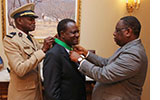 Senegal has bestowed high national honours on ECOWAS Commission President Kadré Désiré Ouédraogo in recognition of his dedicated service to West Africa. Ouédraogo is stepping down from his post after four years of service at the head of the regional organisation. During a farewell visit to Dakar on 18 February, he was honoured with the rank of Commander of the National Order of the Lion. Senegalese President and current ECOWAS Chairman Macky Sall bestowed the honour and commended Ouédraogo for the progress achieved during his term, particularly in the areas of peace and security and economic integration. "I congratulate you, and it is my pleasure in this farewell visit, to bring to your notice, the appreciation of the entire Community for the tremendous job you have executed," President Sall said. Ouédraogo in turn thanked the Senegalese President and praised his record as head of the ECOWAS Authority of Heads of State and Government. He dedicated the recognition to all ECOWAS staff for their dedicated service and commitment to Community objectives. "I am honoured to have been privileged to work for our region in this high degree of responsibility," he said. "We must have the heart to continue to consolidate and especially quicken the pace of our regional integration in order to participate in the unification of the African continent." Mr Ouédraogo actively participated and contributed to work conducted by the Sahel and West Africa Club (SWAC). The ECOWAS Commission joined SWAC in 2009 as a full Member.
Senegal has bestowed high national honours on ECOWAS Commission President Kadré Désiré Ouédraogo in recognition of his dedicated service to West Africa. Ouédraogo is stepping down from his post after four years of service at the head of the regional organisation. During a farewell visit to Dakar on 18 February, he was honoured with the rank of Commander of the National Order of the Lion. Senegalese President and current ECOWAS Chairman Macky Sall bestowed the honour and commended Ouédraogo for the progress achieved during his term, particularly in the areas of peace and security and economic integration. "I congratulate you, and it is my pleasure in this farewell visit, to bring to your notice, the appreciation of the entire Community for the tremendous job you have executed," President Sall said. Ouédraogo in turn thanked the Senegalese President and praised his record as head of the ECOWAS Authority of Heads of State and Government. He dedicated the recognition to all ECOWAS staff for their dedicated service and commitment to Community objectives. "I am honoured to have been privileged to work for our region in this high degree of responsibility," he said. "We must have the heart to continue to consolidate and especially quicken the pace of our regional integration in order to participate in the unification of the African continent." Mr Ouédraogo actively participated and contributed to work conducted by the Sahel and West Africa Club (SWAC). The ECOWAS Commission joined SWAC in 2009 as a full Member.
Article in English: http://www.elombah.com/president-honours-ouedraogo
Article in French: http://www.ecowas.int/national-order-of-senegal/?lang=fr
West African officials mark 50th anniversary of UNDP
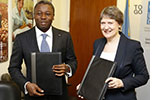 Togolese President Faure Gnassingbé, Senegalese Prime Minister Mohammed Dionne and Ghanaian Foreign Minister Hanna Tetteh were among the high-level West African officials in attendance at the 50thAnniversary Ministerial Meeting of the United Nations Development Programme (UNDP). Speaking during the opening session, the Togolese President reflected on the history of co-operation between his country and the UN agency. "UNDP's action made the difference at a critical moment in our country's development," he said. President Gnassingbé met with UNDP Administrator Helen Clark on the sidelines of the event. The two leaders exchanged documents to officially launch the Emergency Community Development Programme (PUDC) for Togo. The three-year USD 258 million programme aims to improve access to basic social services for vulnerable rural and semi-urban populations. It also seeks to involve communities in the economic and social development of their local areas. "PUDC delivers on the promises made to the people of Togo to meet their basic needs," President Gnassingbé said. UNDP has been working in Africa since the agency's creation in 1966. Its Regional Bureau for Africa serves 46 countries in sub-Saharan Africa with 45 country offices, a regional hub in Addis Ababa and an additional office in Dakar.
Togolese President Faure Gnassingbé, Senegalese Prime Minister Mohammed Dionne and Ghanaian Foreign Minister Hanna Tetteh were among the high-level West African officials in attendance at the 50thAnniversary Ministerial Meeting of the United Nations Development Programme (UNDP). Speaking during the opening session, the Togolese President reflected on the history of co-operation between his country and the UN agency. "UNDP's action made the difference at a critical moment in our country's development," he said. President Gnassingbé met with UNDP Administrator Helen Clark on the sidelines of the event. The two leaders exchanged documents to officially launch the Emergency Community Development Programme (PUDC) for Togo. The three-year USD 258 million programme aims to improve access to basic social services for vulnerable rural and semi-urban populations. It also seeks to involve communities in the economic and social development of their local areas. "PUDC delivers on the promises made to the people of Togo to meet their basic needs," President Gnassingbé said. UNDP has been working in Africa since the agency's creation in 1966. Its Regional Bureau for Africa serves 46 countries in sub-Saharan Africa with 45 country offices, a regional hub in Addis Ababa and an additional office in Dakar.
Article in English: http://www.africa.undp.org/togo-undp-development-program.html
Article in French: http://www.tg.undp.org/togo-et-le-pnud-d-veloppement/
SWAC co-hosts debate on the informal economy
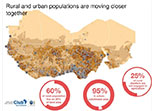 On 25 February 2016, the Sahel and West Africa Club Secretariat (SWAC/OECD), the International Institute for Environment and Development (IIED) and their partners co-hosted an event in London on "the biggest private sector": the informal economy. The purpose of the conference was to contribute towards building a new policy agenda integrating the informal economy in inclusive green growth policies. The SWAC Secretariat organised Session 2 which looked at informality and rural transition. The Secretariat introduced the session by providing evidence on the increasing role of the informal economy in rural transformation driven by intense rural-urban linkages and urbanisation-led development of the regional food economy. Also in the same session, Alejandro Guarín of the German Development Institute, presented insights on the green growth aspects of small-holder farming in Peru and Louise Fox from the University of California, Berkeley, discussed rural non-farm enterprises in sub-Saharan Africa. West African rural livelihoods and economies are experiencing major transformations. 25% of rural dwellers are no longer engaged in agriculture and 40% of rural households operate some kind of non-farm informal enterprise. The SWAC Secretariat's innovation programme on food economy transformations shows rural employment increasing in post-harvest segments of food value chains such as processing, logistics and distribution. A better appreciation of the realities of informal activities in rural areas and greater data collection and evidence are the critical next steps to be taken to adjust current rural development and food security policies.
On 25 February 2016, the Sahel and West Africa Club Secretariat (SWAC/OECD), the International Institute for Environment and Development (IIED) and their partners co-hosted an event in London on "the biggest private sector": the informal economy. The purpose of the conference was to contribute towards building a new policy agenda integrating the informal economy in inclusive green growth policies. The SWAC Secretariat organised Session 2 which looked at informality and rural transition. The Secretariat introduced the session by providing evidence on the increasing role of the informal economy in rural transformation driven by intense rural-urban linkages and urbanisation-led development of the regional food economy. Also in the same session, Alejandro Guarín of the German Development Institute, presented insights on the green growth aspects of small-holder farming in Peru and Louise Fox from the University of California, Berkeley, discussed rural non-farm enterprises in sub-Saharan Africa. West African rural livelihoods and economies are experiencing major transformations. 25% of rural dwellers are no longer engaged in agriculture and 40% of rural households operate some kind of non-farm informal enterprise. The SWAC Secretariat's innovation programme on food economy transformations shows rural employment increasing in post-harvest segments of food value chains such as processing, logistics and distribution. A better appreciation of the realities of informal activities in rural areas and greater data collection and evidence are the critical next steps to be taken to adjust current rural development and food security policies.
Find out +: http://www.iied.org/biggest-private-sector-growth
SWAC presentation: http://fr.slideshare.net/IIEDslides/informality-and-rural-transition-urbanisation-food-economy-and-changing-rural-livelihoods
Cape Verde: CILSS project rehabilitates 70 hectares of farmland
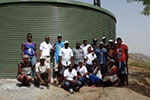 Farmers and residents of the Cape Verde municipality of Santa Cruz have reported significant results from a project to improve the management of agricultural land. A delegation of experts from the CILSS Executive Secretariat and the Sahel Institute visited Cape Verde from 1 to 7 February to assess the impacts of the project implemented from 2013-15 with the aim of improving water management and agricultural practices through the mastery of drip irrigation. The evaluation mission reports that the project rehabilitated 70 hectares of arable land. Among other things, the project installed drip irrigation systems, constructed a 254 cubic metre capacity water storage tank, rehabilitated five water tanks and safeguarded two others and constructed a dam to protect farmland against salinization. The evaluation mission visited project sites and met with local actors who shared their experiences and drew lessons from the implementation of the project. Santa Cruz has a mainly agricultural economy and is the poorest municipality in Cape Verde. Mayor Carlos Alberto Gonçalves Silva said increasing agricultural production would help to reduce rural poverty and give residents incentive to remain in the area. "Many families have benefited from the interventions (of the project). They can now better cope with the adversities of nature. The results are already visible in households... Beyond the direct benefits, the town is enriched with additional capacity in project management."
Farmers and residents of the Cape Verde municipality of Santa Cruz have reported significant results from a project to improve the management of agricultural land. A delegation of experts from the CILSS Executive Secretariat and the Sahel Institute visited Cape Verde from 1 to 7 February to assess the impacts of the project implemented from 2013-15 with the aim of improving water management and agricultural practices through the mastery of drip irrigation. The evaluation mission reports that the project rehabilitated 70 hectares of arable land. Among other things, the project installed drip irrigation systems, constructed a 254 cubic metre capacity water storage tank, rehabilitated five water tanks and safeguarded two others and constructed a dam to protect farmland against salinization. The evaluation mission visited project sites and met with local actors who shared their experiences and drew lessons from the implementation of the project. Santa Cruz has a mainly agricultural economy and is the poorest municipality in Cape Verde. Mayor Carlos Alberto Gonçalves Silva said increasing agricultural production would help to reduce rural poverty and give residents incentive to remain in the area. "Many families have benefited from the interventions (of the project). They can now better cope with the adversities of nature. The results are already visible in households... Beyond the direct benefits, the town is enriched with additional capacity in project management."
Article in French: http://www.cilss.bf/spip.php?article578
ECOWAS/RAAF: Operationalising the Regional Food Security Reserve - call for proposals
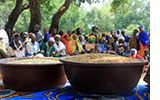 Backed by the G20, endorsed by West African heads of state in 2012 and funded by the European Union, the Regional Food Security Reserve is taking a big step toward operationalisation. Hosted within the ECOWAS Regional Agency for Agriculture and Food (RAAF) in Lomé, the Technical Management Unit composed of seven food security experts is now operational. ECOWAS/RAAF is planning to set-up its first physical stock of some 15 000 tonnes of cereals and 1 350 tonnes of fortified flour in 2016 and to double its storage capacity to 30 000 tonnes of cereals at the beginning of 2017. To accelerate the process, the regional physical food stocks will build on existing storage infrastructure within four sub-regions: 1) Northern Nigeria/Niger/ Northern Benin (Eastern sub-area); 2) Southern Mali/Southern Burkina Faso/Northern Ghana/Northern Côte d'Ivoire, Northern Togo (Central sub-area); 3) Senegal, Gambia (Western Atlantic sub-area); and 4) Guinea/Liberia/Sierra Leone (Atlantic Gulf sub-area). ECOWAS/RAAF has launched a call for proposals to select public bodies with storage infrastructure and equipment as well as professional expertise in order to sub-contract the reception, storage and maintenance of physical stocks. Interested companies, boards, agencies or commissions in charge of the management of the food security stocks of ECOWAS member states are invited to apply. The deadline for the submission of proposals is 4 April 2016.
Backed by the G20, endorsed by West African heads of state in 2012 and funded by the European Union, the Regional Food Security Reserve is taking a big step toward operationalisation. Hosted within the ECOWAS Regional Agency for Agriculture and Food (RAAF) in Lomé, the Technical Management Unit composed of seven food security experts is now operational. ECOWAS/RAAF is planning to set-up its first physical stock of some 15 000 tonnes of cereals and 1 350 tonnes of fortified flour in 2016 and to double its storage capacity to 30 000 tonnes of cereals at the beginning of 2017. To accelerate the process, the regional physical food stocks will build on existing storage infrastructure within four sub-regions: 1) Northern Nigeria/Niger/ Northern Benin (Eastern sub-area); 2) Southern Mali/Southern Burkina Faso/Northern Ghana/Northern Côte d'Ivoire, Northern Togo (Central sub-area); 3) Senegal, Gambia (Western Atlantic sub-area); and 4) Guinea/Liberia/Sierra Leone (Atlantic Gulf sub-area). ECOWAS/RAAF has launched a call for proposals to select public bodies with storage infrastructure and equipment as well as professional expertise in order to sub-contract the reception, storage and maintenance of physical stocks. Interested companies, boards, agencies or commissions in charge of the management of the food security stocks of ECOWAS member states are invited to apply. The deadline for the submission of proposals is 4 April 2016.
Call for proposals in English
Call for proposal in French
Opinion: The Sustainable Development Goals and development co-operation
![]() The recent adoption of the Sustainable Development Goals and the Paris Agreement on climate change represents a fundamental shift in the policy environment for development. Erik Solheim, chair of the OECD Development Assistance Committee, writes about the practical implications of this shift in a post on the OECD Insights blog. While official development assistance (ODA) will continue to play an important role in financing transformation, Solheim writes that achieving the objective of sustainable development calls for the mobilisation of more and better resources from both the public and private sectors. "The Sustainable Development Goals envision a new growth model, one that is inclusive, sustainable and resilient. In the face of mounting global challenges, a new approach to growth requires consideration of how the benefits of growth are distributed, the impact on the environment and the stability of the global financial and economic system. A growth strategy incorporating all these elements does not involve following a single recipe. This is because no single recipe exists."
The recent adoption of the Sustainable Development Goals and the Paris Agreement on climate change represents a fundamental shift in the policy environment for development. Erik Solheim, chair of the OECD Development Assistance Committee, writes about the practical implications of this shift in a post on the OECD Insights blog. While official development assistance (ODA) will continue to play an important role in financing transformation, Solheim writes that achieving the objective of sustainable development calls for the mobilisation of more and better resources from both the public and private sectors. "The Sustainable Development Goals envision a new growth model, one that is inclusive, sustainable and resilient. In the face of mounting global challenges, a new approach to growth requires consideration of how the benefits of growth are distributed, the impact on the environment and the stability of the global financial and economic system. A growth strategy incorporating all these elements does not involve following a single recipe. This is because no single recipe exists."
Article in English: http://oecdinsights.org/development-co-operation/
Publication: Arts across West Africa
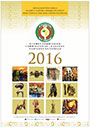 The ECOWAS Commission has published a 2016 calendar showcasing works of art from around the region. The calendar features full colour representations of traditional and contemporary artworks including paintings, sculptures and masks. The calendar also highlights the dates of national day celebrations for each of the 15 member states.
The ECOWAS Commission has published a 2016 calendar showcasing works of art from around the region. The calendar features full colour representations of traditional and contemporary artworks including paintings, sculptures and masks. The calendar also highlights the dates of national day celebrations for each of the 15 member states.
Download the calendar: http://www.ecowas.int/CALENDAR-2016.pdf
